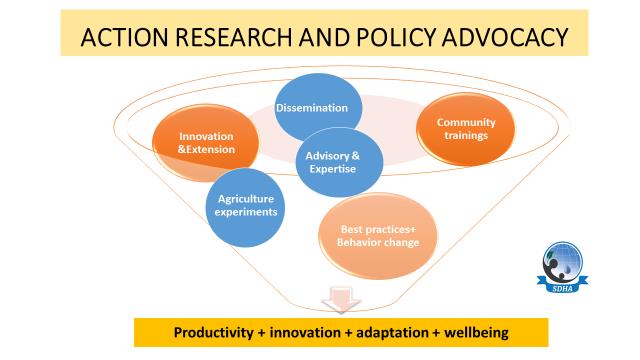
 Policy advocacy, community Action research and Knowledge management are interlinked actions and aim at enhancing development of the communities.
Policy advocacy, community Action research and Knowledge management are interlinked actions and aim at enhancing development of the communities.
Community Action Research (CAR) is a disciplined and participatory process where action is taken to find solutions to identified issues affecting communities.
In CAR, Results come from and benefit to the communities who make use of them the most.
Community Action Research go through 7 key steps which are the following:
These seven steps, which become an endless cycle for the inquiring teacher, are the following:
- Selecting a focus
- Clarifying theories
- Identifying research questions
- Collecting data
- Analyzing data
- Reporting results
- Taking informed action
SDHA carries its Community action research on different sectors with the most critical issues affecting the beneficiary communities which are the following:
SDHA priority areas for action research
1.Agriculture and food security: Agriculture experiments on best farming practices, high yield varieties, draught resistant crops all to address food insecurity and sustainable use of land
2.Water management: Water governance issues, sustainable management of Infrastructure, etc
3.Environment and Climate Change: Possible solutions for climate adaptation and mitigation, EIA, IWRM plan, etc
4.Community awareness and behavior change: Gender integration, social inclusion, youth empowerment
5.Community empowerment: Promoting local business and market analysis
The outcome of the Community Action Research serve to same beneficiary community, knowledge management as best practices sharing with other communities and interested stakeholders but also to use for policy advocacy.
Action research in vulnerable households
SDHA works with 100 pilot households in Muhanga districts as pilot group for action research. After scoping and action research design, the group has been identified in collaboration with local authorities to select the focus group /beneficiaries made of Pro-poor households (Social Categories Ubudehe 1 &2).
SDHA beliefs in CAR lies in VITAL Approach. Finding appropriate solutions to community issues by testing the development models with, by and for beneficiaries to find valid and reliable results to duplicate widely among the same communities and elsewhere in a shared context. In this line therefore, SDHA work with well-defined group (Pro-poor), establish the baseline, use integrated approach to generate measurable impact among beneficiaries.
SDHA Research Team works with Universities and Higher Learning institutions, policy makers, volunteers/junior researchers and sister organizations (NGOs) for best practices sharing.

